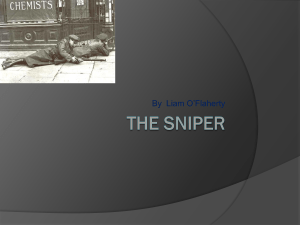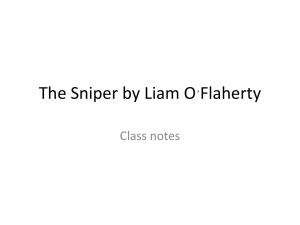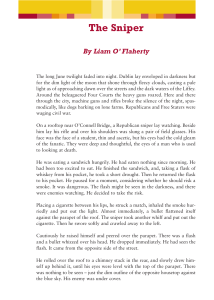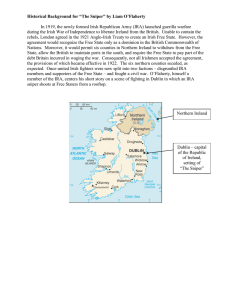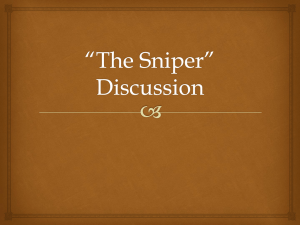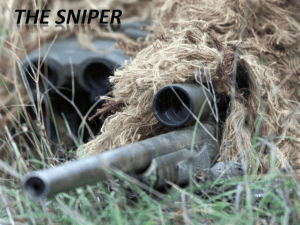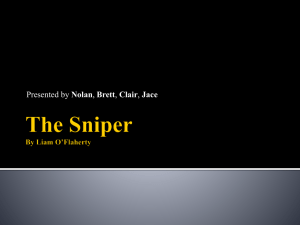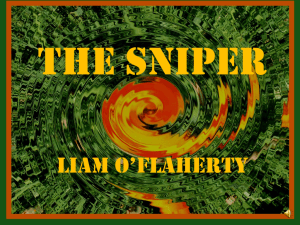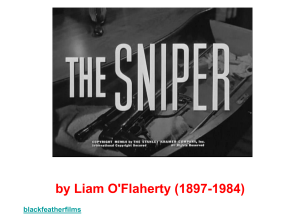Found Poem Charles
advertisement
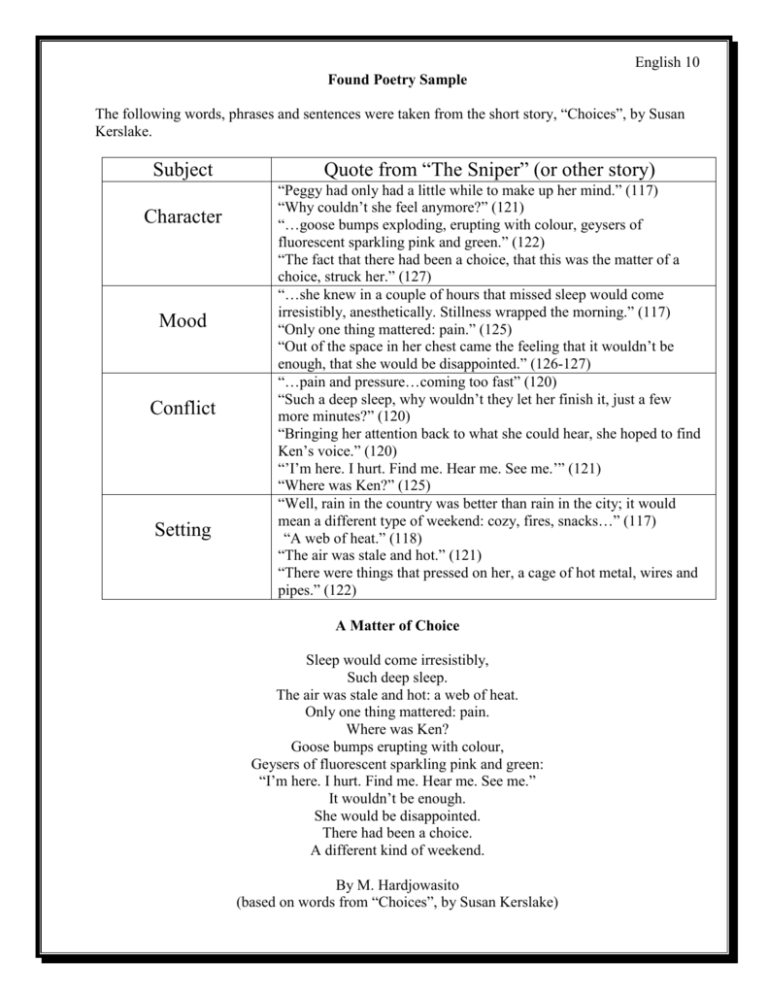
English 10 Found Poetry Sample The following words, phrases and sentences were taken from the short story, “Choices”, by Susan Kerslake. Subject Character Mood Conflict Setting Quote from “The Sniper” (or other story) “Peggy had only had a little while to make up her mind.” (117) “Why couldn’t she feel anymore?” (121) “…goose bumps exploding, erupting with colour, geysers of fluorescent sparkling pink and green.” (122) “The fact that there had been a choice, that this was the matter of a choice, struck her.” (127) “…she knew in a couple of hours that missed sleep would come irresistibly, anesthetically. Stillness wrapped the morning.” (117) “Only one thing mattered: pain.” (125) “Out of the space in her chest came the feeling that it wouldn’t be enough, that she would be disappointed.” (126-127) “…pain and pressure…coming too fast” (120) “Such a deep sleep, why wouldn’t they let her finish it, just a few more minutes?” (120) “Bringing her attention back to what she could hear, she hoped to find Ken’s voice.” (120) “’I’m here. I hurt. Find me. Hear me. See me.’” (121) “Where was Ken?” (125) “Well, rain in the country was better than rain in the city; it would mean a different type of weekend: cozy, fires, snacks…” (117) “A web of heat.” (118) “The air was stale and hot.” (121) “There were things that pressed on her, a cage of hot metal, wires and pipes.” (122) A Matter of Choice Sleep would come irresistibly, Such deep sleep. The air was stale and hot: a web of heat. Only one thing mattered: pain. Where was Ken? Goose bumps erupting with colour, Geysers of fluorescent sparkling pink and green: “I’m here. I hurt. Find me. Hear me. See me.” It wouldn’t be enough. She would be disappointed. There had been a choice. A different kind of weekend. By M. Hardjowasito (based on words from “Choices”, by Susan Kerslake) English “Charles” Found Poetry Assignment Found poetry involves borrowing the author’s words and phrases from a prose piece (usually short story or novel) and reorganizing them in a meaningful way into a poem. The poem is usually free verse, meaning it has no set rhyme or rhythm. Instructions: On the chart on the flip side of this handout, please write down exact words and phrases from “Charles” which contribute to character, conflict, setting and mood/atmosphere. In doing so, choose words, phrases or complete sentences that are particularly evocative and place them in the appropriate column. Remember to include page references. Next, start arranging these words and phrases – you don’t necessarily have to use all the words/phrases you’ve recorded – into a poem that reflects the nature of the character or the conflict, or the significance of the setting or mood The poem may be free verse – it does not need to rhyme, and each line may vary in length You may eliminate words from a phrase if necessary, but please do not ADD any of your own words or phrases Next, focus on an image in the story that stands out to you quite strongly. Include this image with the good copy of your poem – please include it on the same paper as your poem. You can use it as the background to your poem, or have it beside the poem. It may be hand-drawn, computer-generated, collage-style (clippings from a magazine or computer art), and so on. Criteria: Poem must be a minimum of 10 lines long Submit a completed Found Poem Chart (on the back of this page) Poem should be typed on computer or handwritten/printed neatly in ink Words of the poem must ONLY be from the story Words must be from a minimum of 5 different sentences from the story Words are organized in a thoughtful way that strongly conveys a clear sense of the character, setting, mood, theme or conflict from the story Must include an image from the story that connects to the poem Assignment value: Due Date: /16 Found Poem Chart Use the chart below to write full sentences from the story. On a separate page, rearrange words and phrases into a meaningful poem. Subject Character Mood Conflict Setting Quote from “Charles” (or other story) The Sniper By Liam O’Flaherty The long June twilight faded into night. Dublin lay enveloped in darkness but for the dim light of the moon that shone through fleecy clouds, casting a pale light as of approaching dawn over the streets and the dark waters of the Liffey. Around the beleaguered Four Courts the heavy guns roared. Here and there through the city, machine guns and rifles broke the silence of the night, spasmodically, like dogs barking on lone farms. Republicans and Free Staters were waging civil war. On a rooftop near O'Connell Bridge, a Republican sniper lay watching. Beside him lay his rifle and over his shoulders was slung a pair of field glasses. His face was the face of a student, thin and ascetic, but his eyes had the cold gleam of the fanatic. They were deep and thoughtful, the eyes of a man who is used to looking at death. He was eating a sandwich hungrily. He had eaten nothing since morning. He had been too excited to eat. He finished the sandwich, and, taking a flask of whiskey from his pocket, he took a short drought. Then he returned the flask to his pocket. He paused for a moment, considering whether he should risk a smoke. It was dangerous. The flash might be seen in the darkness, and there were enemies watching. He decided to take the risk. Placing a cigarette between his lips, he struck a match, inhaled the smoke hurriedly and put out the light. Almost immediately, a bullet flattened itself against the parapet of the roof. The sniper took another whiff and put out the cigarette. Then he swore softly and crawled away to the left. Cautiously he raised himself and peered over the parapet. There was a flash and a bullet whizzed over his head. He dropped immediately. He had seen the flash. It came from the opposite side of the street. He rolled over the roof to a chimney stack in the rear, and slowly drew himself up behind it, until his eyes were level with the top of the parapet. There was nothing to be seen--just the dim outline of the opposite housetop against the blue sky. His enemy was under cover. Just then an armored car came across the bridge and advanced slowly up the street. It stopped on the opposite side of the street, fifty yards ahead. The sniper could hear the dull panting of the motor. His heart beat faster. It was an enemy car. He wanted to fire, but he knew it was useless. His bullets would never pierce the steel that covered the gray monster. Then round the corner of a side street came an old woman, her head covered by a tattered shawl. She began to talk to the man in the turret of the car. She was pointing to the roof where the sniper lay. An informer. The turret opened. A man's head and shoulders appeared, looking toward the sniper. The sniper raised his rifle and fired. The head fell heavily on the turret wall. The woman darted toward the side street. The sniper fired again. The woman whirled round and fell with a shriek into the gutter. Suddenly from the opposite roof a shot rang out and the sniper dropped his rifle with a curse. The rifle clattered to the roof. The sniper thought the noise would wake the dead. He stooped to pick the rifle up. He couldn't lift it. His forearm was dead. "I'm hit," he muttered. Dropping flat onto the roof, he crawled back to the parapet. With his left hand he felt the injured right forearm. The blood was oozing through the sleeve of his coat. There was no pain--just a deadened sensation, as if the arm had been cut off. Quickly he drew his knife from his pocket, opened it on the breastwork of the parapet, and ripped open the sleeve. There was a small hole where the bullet had entered. On the other side there was no hole. The bullet had lodged in the bone. It must have fractured it. He bent the arm below the wound. the arm bent back easily. He ground his teeth to overcome the pain. Then taking out his field dressing, he ripped open the packet with his knife. He broke the neck of the iodine bottle and let the bitter fluid drip into the wound. A paroxysm of pain swept through him. He placed the cotton wadding over the wound and wrapped the dressing over it. He tied the ends with his teeth. Then he lay still against the parapet, and, closing his eyes, he made an effort of will to overcome the pain. In the street beneath all was still. The armored car had retired speedily over the bridge, with the machine gunner's head hanging lifeless over the turret. The woman's corpse lay still in the gutter. The sniper lay still for a long time nursing his wounded arm and planning escape. Morning must not find him wounded on the roof. The enemy on the opposite roof coverd his escape. He must kill that enemy and he could not use his rifle. He had only a revolver to do it. Then he thought of a plan. Taking off his cap, he placed it over the muzzle of his rifle. Then he pushed the rifle slowly upward over the parapet, until the cap was visible from the opposite side of the street. Almost immediately there was a report, and a bullet pierced the center of the cap. The sniper slanted the rifle forward. The cap clipped down into the street. Then catching the rifle in the middle, the sniper dropped his left hand over the roof and let it hang, lifelessly. After a few moments he let the rifle drop to the street. Then he sank to the roof, dragging his hand with him. Crawling quickly to his feet, he peered up at the corner of the roof. His ruse had succeeded. The other sniper, seeing the cap and rifle fall, thought that he had killed his man. He was now standing before a row of chimney pots, looking across, with his head clearly silhouetted against the western sky. The Republican sniper smiled and lifted his revolver above the edge of the parapet. The distance was about fifty yards--a hard shot in the dim light, and his right arm was paining him like a thousand devils. He took a steady aim. His hand trembled with eagerness. Pressing his lips together, he took a deep breath through his nostrils and fired. He was almost deafened with the report and his arm shook with the recoil. Then when the smoke cleared, he peered across and uttered a cry of joy. His enemy had been hit. He was reeling over the parapet in his death agony. He struggled to keep his feet, but he was slowly falling forward as if in a dream. The rifle fell from his grasp, hit the parapet, fell over, bounded off the pole of a barber's shop beneath and then clattered on the pavement. Then the dying man on the roof crumpled up and fell forward. The body turned over and over in space and hit the ground with a dull thud. Then it lay still. The sniper looked at his enemy falling and he shuddered. The lust of battle died in him. He became bitten by remorse. The sweat stood out in beads on his forehead. Weakened by his wound and the long summer day of fasting and watching on the roof, he revolted from the sight of the shattered mass of his dead enemy. His teeth chattered, he began to gibber to himself, cursing the war, cursing himself, cursing everybody. He looked at the smoking revolver in his hand, and with an oath he hurled it to the roof at his feet. The revolver went off with a concussion and the bullet whizzed past the sniper's head. He was frightened back to his senses by the shock. His nerves steadied. The cloud of fear scattered from his mind and he laughed. Taking the whiskey flask from his pocket, he emptied it a drought. He felt reckless under the influence of the spirit. He decided to leave the roof now and look for his company commander, to report. Everywhere around was quiet. There was not much danger in going through the streets. He picked up his revolver and put it in his pocket. Then he crawled down through the skylight to the house underneath. When the sniper reached the laneway on the street level, he felt a sudden curiosity as to the identity of the enemy sniper whom he had killed. He decided that he was a good shot, whoever he was. He wondered did he know him. Perhaps he had been in his own company before the split in the army. He decided to risk going over to have a look at him. He peered around the corner into O'Connell Street. In the upper part of the street there was heavy firing, but around here all was quiet. The sniper darted across the street. A machine gun tore up the ground around him with a hail of bullets, but he escaped. He threw himself face downward beside the corpse. The machine gun stopped. Then the sniper turned over the dead body and looked into his brother's face.
